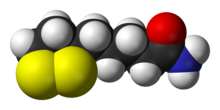Lipoamide is a trivial name for 6,8-dithiooctanoic amide. It is the functional form of lipoic acid, i.e the carboxyl group is attached to protein via an amine with an amide linkage.[1] Illustrative of the biochemical role of lipoamide is in the conversion of pyruvate to acetyl lipoamide.[2]

| |

| |
| Names | |
|---|---|
| IUPAC name
5-(1,2-Dithiolan-3-yl)pentanamide
| |
| Identifiers | |
3D model (JSmol)
|
|
| ChEBI | |
| ChemSpider | |
| KEGG | |
| MeSH | lipoamide |
PubChem CID
|
|
| UNII | |
| |
| |
| Properties | |
| C8H15NOS2 | |
| Molar mass | 205.343 g/mol |
Except where otherwise noted, data are given for materials in their standard state (at 25 °C [77 °F], 100 kPa).
| |
Lipoamide is found in a large number of plant and animal-based foods.[1]
See also
editReferences
edit- ^ a b "Metabocard for Lipoamide". Human Metabolome Database. 14 September 2021. HMDB0000962. Retrieved 30 November 2022.
- ^ J. M. Berg; J. L. Tymoczko, L. Stryer (2007). Biochemistry (6th ed.). Freeman. ISBN 978-0-7167-8724-2.
External links
edit- Media related to Lipoamide at Wikimedia Commons
